《新概念英语》第二册语法精粹
- 格式:doc
- 大小:1.17 MB
- 文档页数:92
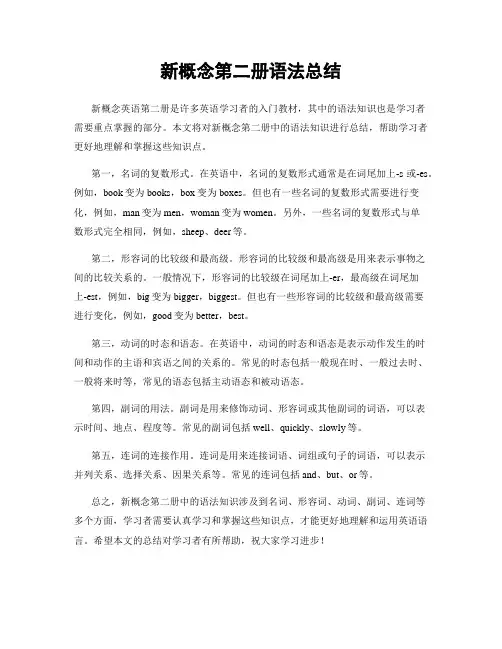
新概念第二册语法总结新概念英语第二册是许多英语学习者的入门教材,其中的语法知识也是学习者需要重点掌握的部分。
本文将对新概念第二册中的语法知识进行总结,帮助学习者更好地理解和掌握这些知识点。
第一,名词的复数形式。
在英语中,名词的复数形式通常是在词尾加上-s或-es。
例如,book变为books,box变为boxes。
但也有一些名词的复数形式需要进行变化,例如,man变为men,woman变为women。
另外,一些名词的复数形式与单数形式完全相同,例如,sheep、deer等。
第二,形容词的比较级和最高级。
形容词的比较级和最高级是用来表示事物之间的比较关系的。
一般情况下,形容词的比较级在词尾加上-er,最高级在词尾加上-est,例如,big变为bigger,biggest。
但也有一些形容词的比较级和最高级需要进行变化,例如,good变为better,best。
第三,动词的时态和语态。
在英语中,动词的时态和语态是表示动作发生的时间和动作的主语和宾语之间的关系的。
常见的时态包括一般现在时、一般过去时、一般将来时等,常见的语态包括主动语态和被动语态。
第四,副词的用法。
副词是用来修饰动词、形容词或其他副词的词语,可以表示时间、地点、程度等。
常见的副词包括well、quickly、slowly等。
第五,连词的连接作用。
连词是用来连接词语、词组或句子的词语,可以表示并列关系、选择关系、因果关系等。
常见的连词包括and、but、or等。
总之,新概念第二册中的语法知识涉及到名词、形容词、动词、副词、连词等多个方面,学习者需要认真学习和掌握这些知识点,才能更好地理解和运用英语语言。
希望本文的总结对学习者有所帮助,祝大家学习进步!。
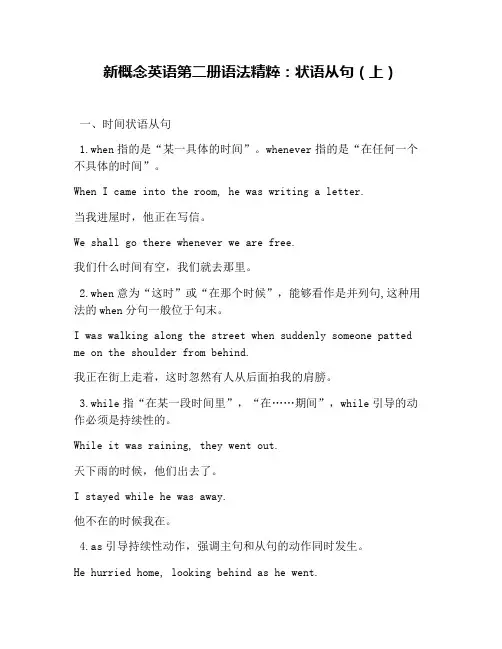
新概念英语第二册语法精粹:状语从句(上)一、时间状语从句1.when指的是“某一具体的时间”。
whenever指的是“在任何一个不具体的时间”。
When I came into the room, he was writing a letter.当我进屋时,他正在写信。
We shall go there whenever we are free.我们什么时间有空,我们就去那里。
2.when意为“这时”或“在那个时候”,能够看作是并列句,这种用法的when分句一般位于句末。
I was walking along the street when suddenly someone patted me on the shoulder from behind.我正在街上走着,这时忽然有人从后面拍我的肩膀。
3.while指“在某一段时间里”,“在……期间”,while引导的动作必须是持续性的。
While it was raining, they went out.天下雨的时候,他们出去了。
I stayed while he was away.他不在的时候我在。
4.as引导持续性动作,强调主句和从句的动作同时发生。
He hurried home, looking behind as he went.他赶快回家,不时地一边走一边向后看。
5.before译为在……之前Be a pupil before you become a teacher.先做学生,再做先生。
6.after译为在……之后He arrived after the game started.比赛开始后,他到了。
7.如主句动词是持续性动作,常用肯定式,表示“直到……为止”。
从属连词为till/untilWe waited till (until) he came back .我们一直等到他回来。
8.如主句动词是瞬间动词,常用否定式,表示“直……才”“在……以前不”,从句放在句首表示强调,一般用untilShe didn’t stop working until eleven o’clock.她到11点钟才停止工作。
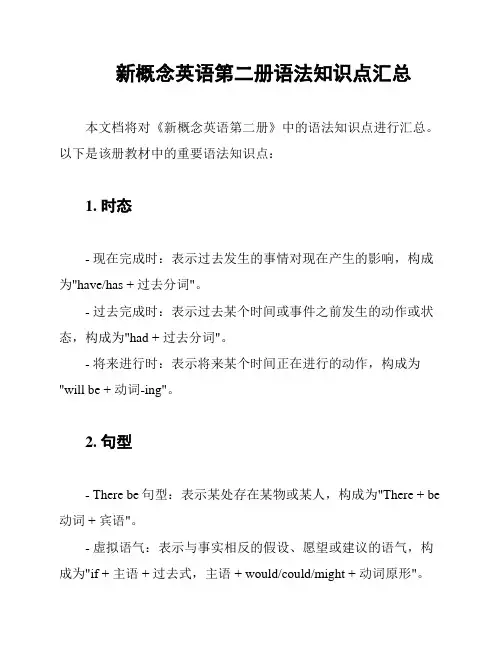
新概念英语第二册语法知识点汇总本文档将对《新概念英语第二册》中的语法知识点进行汇总。
以下是该册教材中的重要语法知识点:1. 时态- 现在完成时:表示过去发生的事情对现在产生的影响,构成为"have/has + 过去分词"。
- 过去完成时:表示过去某个时间或事件之前发生的动作或状态,构成为"had + 过去分词"。
- 将来进行时:表示将来某个时间正在进行的动作,构成为"will be + 动词-ing"。
2. 句型- There be句型:表示某处存在某物或某人,构成为"There + be 动词 + 宾语"。
- 虚拟语气:表示与事实相反的假设、愿望或建议的语气,构成为"if + 主语 + 过去式,主语 + would/could/might + 动词原形"。
3. 名词- 可数名词与不可数名词:可数名词可以同时使用单复数形式,而不可数名词只能使用单数形式。
- 复合名词:由两个或更多个词构成的名词,如"homework"、"football"等。
4. 冠词- 定冠词:表示特指的冠词,如"the"。
- 不定冠词:表示泛指的冠词,如"a/an"。
5. 代词- 主格代词:在句子中作主语,如"I"、"you"等。
- 宾格代词:在句子中作宾语,如"me"、"you"等。
- 物主代词:表示所属关系的代词,如"my"、"your"等。
6. 动词- 不定式:表示动作的动词原形,可以作主语、宾语等,如"to eat"。
- 动词的时态变化:根据不同的时态,在动词前加不同的助动词,如"is/am/are"表示现在进行时。
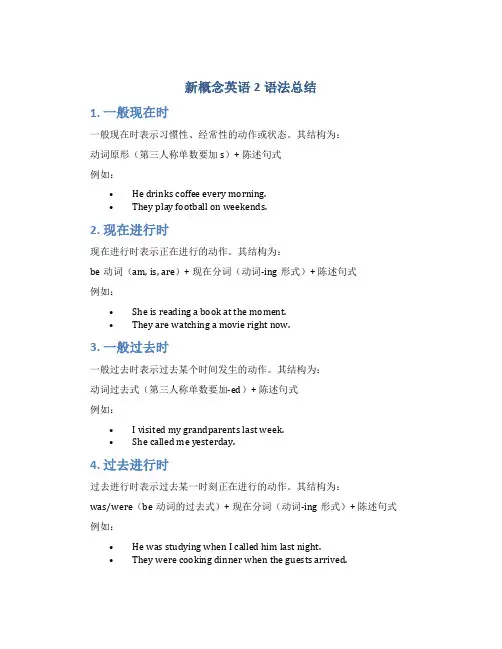
新概念英语2语法总结1. 一般现在时一般现在时表示习惯性、经常性的动作或状态。
其结构为:动词原形(第三人称单数要加s)+ 陈述句式例如:•He drinks coffee every morning.•They play football on weekends.2. 现在进行时现在进行时表示正在进行的动作。
其结构为:be动词(am, is, are)+ 现在分词(动词-ing形式)+ 陈述句式例如:•She is reading a book at the moment.•They are watching a movie right now.3. 一般过去时一般过去时表示过去某个时间发生的动作。
其结构为:动词过去式(第三人称单数要加-ed)+ 陈述句式例如:•I visited my grandparents last week.•She called me yesterday.4. 过去进行时过去进行时表示过去某一时刻正在进行的动作。
其结构为:was/were(be动词的过去式)+ 现在分词(动词-ing形式)+ 陈述句式例如:•He was studying when I called him last night.•They were cooking dinner when the guests arrived.5. 一般将来时一般将来时表示将来某个时间会发生的动作或状态。
其结构为:will/shall(情态动词)+ 动词原形 + 陈述句式例如:•I will visit my friend next week.•He will cook dinner tonight.6. 现在完成时现在完成时表示过去某个时间范围内发生的动作,且与现在有关。
其结构为:have/has(情态动词)+ 过去分词(动词的第三态)+ 陈述句式例如:•She has finished her homework.•They have watched that movie.7. 过去完成时过去完成时表示过去某个时间点之前已经发生的动作或状态。
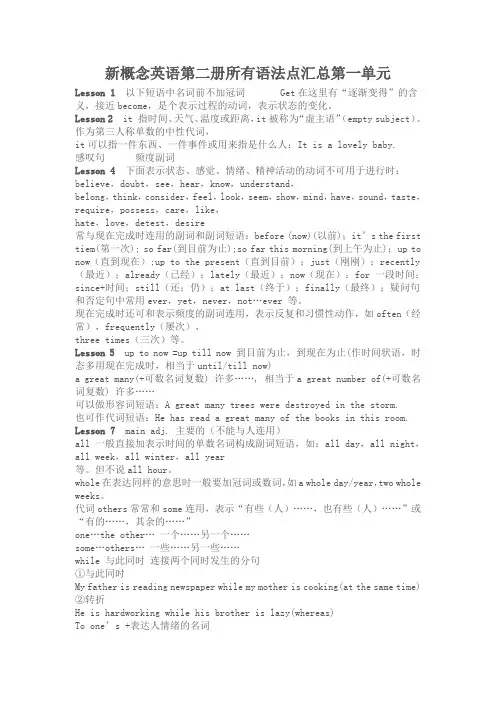
新概念英语第二册所有语法点汇总第一单元Lesson 1 以下短语中名词前不加冠词Get在这里有“逐渐变得”的含义,接近become,是个表示过程的动词,表示状态的变化。
Lesson 2 it 指时间、天气、温度或距离,it被称为“虚主语”(empty subject)。
作为第三人称单数的中性代词,it可以指一件东西、一件事件或用来指是什么人:It is a lovely baby.感叹句频度副词Lesson 4 下面表示状态、感觉、情绪、精神活动的动词不可用于进行时:believe,doubt,see,hear,know,understand,belong,think,consider,feel,look,seem,show,mind,have,sound,taste,require,possess,care,like,hate,love,detest,desire常与现在完成时连用的副词和副词短语:before (now)(以前);it’s the first tiem(第一次); so far(到目前为止);so far this morning(到上午为止);up to now(直到现在);up to the present(直到目前);just(刚刚);recently (最近);already(已经);lately(最近);now(现在);for 一段时间;since+时间;still(还;仍);at last(终于);finally(最终);疑问句和否定句中常用ever,yet,never,not…ever 等。
现在完成时还可和表示频度的副词连用,表示反复和习惯性动作,如often(经常),frequently(屡次),three times(三次)等。
Lesson 5 up to now =up till now 到目前为止,到现在为止(作时间状语,时态多用现在完成时,相当于until/till now)a great many(+可数名词复数) 许多……, 相当于a great number of(+可数名词复数) 许多……可以做形容词短语:A great many trees were destroyed in the storm.也可作代词短语:He has read a great many of the books in this room. Lesson 7 main adj. 主要的(不能与人连用)all 一般直接加表示时间的单数名词构成副词短语,如:all day,all night,all week,all winter,all year等。
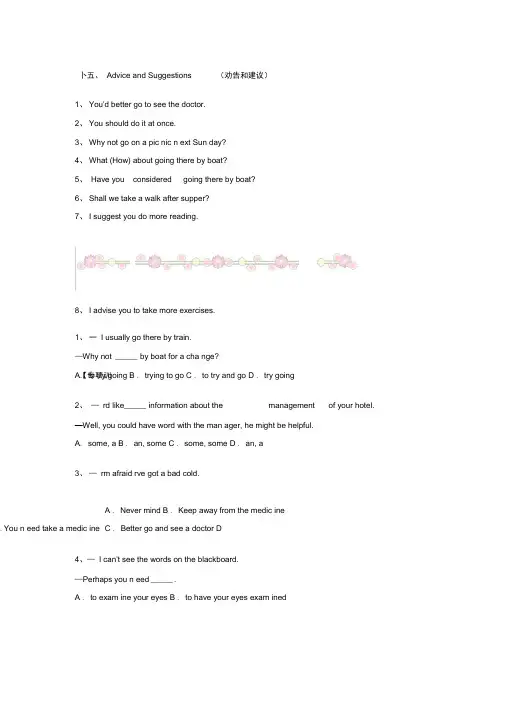
卜五、 Advice and Suggestions (劝告和建议)1、 You'd better go to see the doctor.2、 You should do it at once.3、 Why not go on a pic nic n ext Sun day?4、 What (How) about going there by boat?5、 Have you considered going there by boat?6、 Shall we take a walk after supper?7、 I suggest you do more reading.8、 I advise you to take more exercises.1、 一 I usually go there by train.—Why not _____ by boat for a cha nge?A . to try goingB . trying to goC . to try and goD . try going2、 — rd like_____ information about the management of your hotel. —Well, you could have word with the man ager, he might be helpful.A . some, aB . an, someC . some, someD . an, a3、 — rm afraid rve got a bad cold.A . Never mindB . Keep away from the medic ineC . Better go and see a doctor D4、— I can't see the words on the blackboard.—Perhaps you n eed _____ .A . to exam ine your eyesB . to have your eyes exam ined.You n eed take a medic ine 【专项训卜五、Advice and Suggestions (劝告和建议)C . to have exam ined your eyesD . your eyes to be exam ined5、一Let's go and see our teacher on Teachers' Day.A. That's will do B . That's allC. That's all right D . All rightKEYS1. D2. A3. C4. B5. D(后设答案,大家不要偷看哦, 嘻嘻……)。
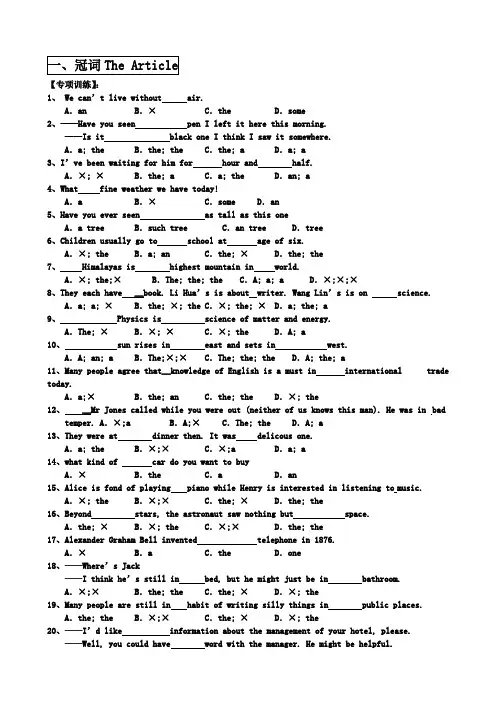
【专项训练】:1、We can’t live without air.A.an B.×C.the D.some2、——Have you seen pen I left it here this morning.——Is it black one I think I saw it somewhere.A.a; the B.the; the C.the; a D.a; a3、I’ve been waiting for him f or hour and half.A.×; ×B.the; a C.a; the D.an; a4、What fine weather we have today!A.a B.×C.some D.an5、Have you ever seen as tall as this oneA.a tree B.such tree C.an tree D.tree6、Children usually go to school at age of six.A.×; the B.a; an C.the; ×D.the; the7、Himalayas is highest mountain in world.A.×; the;×B.The; the; the C.A; a; a D.×;×;×8、They each have __book. Li Hua’s is about writer. Wang Lin’s is on science.A.a; a; ×B.the; ×; the C.×; the; ×D.a; the; a9、Physics is science of matter and energy.A.The; ×B.×; ×C.×; the D.A; a10、sun rises in east and sets in west.A.A; an; a B.The;×;×C.The; the; the D.A; the; a11、Many people agree that__knowledge of English is a must in international trade today.A.a;×B.the; an C.the; the D.×; the12、__Mr Jones called while you were out (neither of us knows this man). He was in badtemper. A.×;a B.A;×C.The; the D.A; a13、They were at dinner then. It was delicous one.A.a; the B.×;×C.×;a D.a; a14、what kind of car do you want to buyA.×B.the C.a D.an15、Alice is fond of playing piano while Henry is interested in listening to music.A.×; the B.×;×C.the; ×D.the; the16、Beyond stars, the astronaut saw nothing but space.A.the; ×B.×; the C.×;×D.the; the17、Alexander Graham Bell invented telephone in 1876.A.×B.a C.the D.one18、——Where’s Jack——I think he’s still in bed, but he might just be in bathroom.A.×;×B.the; the C.the; ×D.×; the19、Many people are still in habit of writing silly things in public places.A.the; the B.×;×C.the; ×D.×; the20、——I’d like information about the management of your hotel, please.——Well, you could have word with the manager. He might be helpful.A.some; a B.an; some C.some; some D.an; a【答案】:1、B air是不可数名词。
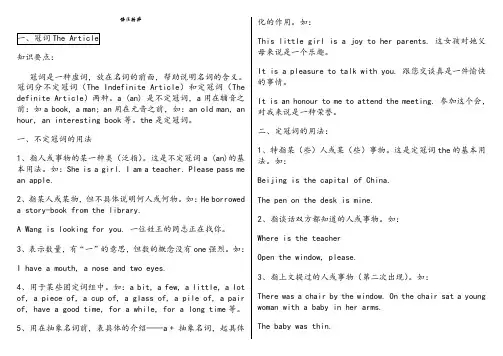
语法精粹知识要点:冠词是一种虚词,放在名词的前面,帮助说明名词的含义。
冠词分不定冠词(The Indefinite Article)和定冠词(The definite Article)两种。
a (an) 是不定冠词,a用在辅音之前:如a book, a man; an用在元音之前,如:an old man, an hour, an interesting book等。
the是定冠词。
一、不定冠词的用法1、指人或事物的某一种类(泛指)。
这是不定冠词a (an)的基本用法。
如:She is a girl. I am a teacher. Please pass me an apple.2、指某人或某物,但不具体说明何人或何物。
如:He borroweda story-book from the library.A Wang is looking for you. 一位姓王的同志正在找你。
3、表示数量,有“一”的意思,但数的概念没有one强烈。
如:I have a mouth, a nose and two eyes.4、用于某些固定词组中。
如:a bit, a few, a little, a lot of, a piece of, a cup of, a glass of, a pile of, a pair of, have a good time, for a while, for a long time等。
5、用在抽象名词前,表具体的介绍——a + 抽象名词,起具体化的作用。
如:This little girl is a joy to her parents. 这女孩对她父母来说是一个乐趣。
It is a pleasure to talk with you. 跟您交谈真是一件愉快的事情。
It is an honour to me to attend the meeting. 参加这个会,对我来说是一种荣誉。
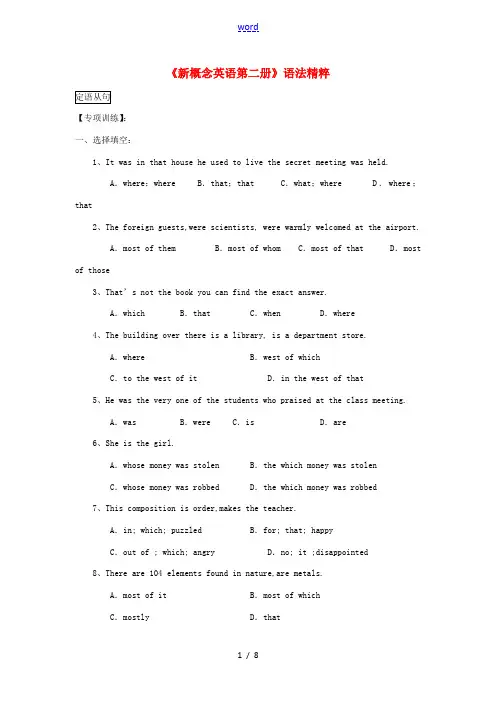
《新概念英语第二册》语法精粹【专项训练】:一、选择填空:1、It was in that house he used to live the secret meeting was held.A.where;where B.that;that C.what;where D.where;that2、The foreign guests,were scientists, were warmly welcomed at the airport.A.most of them B.most of whom C.most of that D.most of those3、That’s not the book you can find the exact answer.A.which B.that C.when D.where4、The building over there is a library, is a department store.A.where B.west of whichC.to the west of it D.in the west of that5、He was the very one of the students who praised at the class meeting.A.was B.were C.is D.are6、She is the girl.A.whose money was stolen B.the which money was stolenC.whose money was robbed D.the which money was robbed7、This composition is order,makes the teacher.A.in; which; puzzled B.for; that; happyC.out of ; which; angry D.no; it ;disappointed8、There are 104 elements found in nature,are metals.A.most of it B.most of whichC.mostly D.that9、Africa is actually connected with Asia at the spotthe Suez Canal was dug.A.when B.where C.which D.and10、Jack is who knows how to work out the problem.A.one of the boys B.the only one of the boyC.not one of the boys D.the only one of the boys11、China has many islands,Taiwan is the largest.A.in where B.in that C.of that D.of which12、Is this factoryyour friends visited the day before yesterday?A.that B.which C.where D.the one13、We have not had for many weeks.A.such cold day as this B.such cold a day as thisC.such a cold day like this D.such a cold day as this14、The man will never forget the dayshe spent with Lenin.A.when B.on which C.on that D.that15、She is the only one of the studentsgood at Japanese.A.that is B.that are C.which is D.which are16、The balls are solid, makes them very heavy.A.it B.what C.which D.that17、Is this calculator you borrowed from Jane?A.which B.one C.the one D.what18、The scientist and his achievementsyou told me about are admired by us.A.who B.that C.which D. /19、I suppose the theory he stuckcorrect.A.to prove B.to proving C.to proved D.prove 20、He is working hard,will make him pass the final exam.A.who B.that C.which D.it21、The museumwe are going to visit is far form our school.A.where B.that C.it D.as22、It is getting hotter and hotter in Wuhan, is usual.A.and B.it C.as D.that23、We will never forget the dayswe spent happily together in the mountain village.A.when B.which C.where D.on which24、Which of the two sheep you keep produces more milk?A.that B.which C.what D.they25、is known to all, Lu Xun was famousa great thinker.A.Which; for B.As; for C.It; as D.As ; as26、Are these glasses?A.which you wish will be repaired B.the ones you wish to have repaired C.the one you wish to repair D. that you wish to be repaired27、The weather turned out to be very good, was more than we could expect.A.what B.which C.that D.it28、In the dark street, there wasn’t a single personshe could turn for help.A.that B.who C.from whom D.to whom29、She heard a terrible noise, brought her heart into her mouth.A.it B.which C.this D.that30、He paid the boy $10 for washing ten windows, most of hadn’t been cleaned for at least a year.A.these B.those C.that D.which31、Finally, the thief handed everything he had stolen to the police.A.which B.what C.whatever D.that32、The only thing,I am not sure is the idiom.A.for which B.of which C.that D.which33、You must give the wallet backit belongs to.A.to whom B.whom C.to one D.to the person who34、Tom as well as his friends whofootball matchesto school today.A.likes; hasn’t gone B.likes; haven’t goneC.like; hasn’t gone D.like; haven’t gone35、You, whoready to offer him your assistance at any time ,are a true friend of his.A.is B.are C.was D.were36、Such a problemshould be settled first.A.like that is B.as this C.as that this is D.like this is37、Women receive the same payin New China.A.as men B.as that men receive C.as which men did D.as men did38、This is one of the best novels thatthis year.A.had appeared B.is appearing C.has appeared D.have appeared39、My father is a humorous man.A., whom you met last night B.whom you met last nightC.whom you met last night D., whom you met last night40、Alfred Hitchcockproduced a new film called Frenzy.A.who is well-known for thriller movies B., who is well-known for thriller movies,C.whom is well-known for thriller movies D., whom is well known for thriller movies41、I’ll take you to a newly opened marketyou may get all you need.A.which; that B.where; that C.in which; which D.where ;what42、Li Lin is the only one of the students whoto Kunming.A.has gone B.have been C.that is D.had gone43、I, your friend ,will try my best to help you.A.that is B.which am C.who is D.who am44、Do you know anything about the accidentin the street yesterday?A.happened B.happening C.which happened D.which was happened45、I’m interested inyou have told me.A.which B.all that C.all what D.that46、I’ll never forget the daysI was staying with you.A.on which B.which C.that D.when47、The king had never seenhorsesthe man drew.A.such ; as B.so; as C.so; that D.such; which48、I am reading the same bookyou did yesterday.A.like B.as C.for D.since49、The buses,were already full, were surrounded by passengers.A.most of them B.most of which C.which most D.that most50、Have you ever been to Xi’an,I left ten years ago.A.where B.which C.that D.when51、We should learn from those are ready to help others.A.who B.whom C.whose D.they52、I have two brothers,are doctors.A.both of them B.both of who C.both of whom D.both of they53、everybody knows, China has the largest population in the world.A.Which B.That C.As D.The thing54、Everythingcan be done should be done.A.which B.that C.all D.that55、This is the house you saw the other day.A.that B.where C.in which D.in that56、Is oxygen the only gashelps fire burn?A.that B./ C.which D.what57、The first placewe visited in that city was a big factory.A.where B.in which C.that D.which58、Which is the largest bridgewas built across the river?A.that B.which C.where D.on which59、Please pass me the dictionarycover is black.A.which B.its C.whose D.which of60、is natural, she goes abroad with her husband.A.It B.What C.Which D.As61、This is the very placeI’m wishing to live in.A.where B.which C.that D.in which62、I think that was the reasonour football team lost the game.A.that B.which C.how D.why63、The reasonhe didn’t come washe was injured.A.that , because B.why, that C.why, because D.that , that64、He must be from Africa, can be seen form his skinA.that B.as C.it D.what65、Is it in that factory“Red Flag〞 cars are made?A.in which B.where C.that D.which二、改错:1、He told us about the countries where he had visited.2、Egypt is a country where is famous for its pyramids.3、China is the country where he spent the best part of his life.4、The days when we spent together cannot be easily forgotten.5、The house stands at the place that the two roads meet.6、We shall visit the college where his father teaches there.7、I know the reason that she looks so worried.8、He left me the book, that is very useful for me.9、This is the room which food is kept.10、April 15, 1976 is the day when we’ll never forget.11、The man came yesterday is our English teacher.12、I know the student was praised at the meeting last week.13、This is all which I can do for you.14、Can you think of anyone who’s house was here?15、The watch that Mother bought it for me works very well.16、This is the only book that were borrowed from the library.17、The day which she had to leave arrived at last.18、The doctor whom they want to see have come.19、Do you know the young man whom has been chosen chairman?20、The park stands at the place that the two rivers meet.21、A plane is a machine can fly.22、It is one of the best pictures which have been sold.23、Those that want to go put up your hands.24、This is the knife with that the doctor did the operation.25、Who is the man whom you said hello just now?【答案】:一、1、D 2、B 3、D 4、B 5、A 6、A7、C 8、B 9、B 10、D 11、D 12、D13、D 14、D 15、A 16、C 17、C 18、B19、C 20、C 21、B 22、C 23、B 24、A25、D 26、B 27、B 28、D 29、B 30、D31、D 32、B 33、D 34、C 35、B 36、B37、A 38、D 39、A 40、B 41、B 42、A43、D 44、C 45、B 46、D 47、A 48、B49、B 50、B 51、A 52、C 53、C 54、B55、A 56、A 57、C 58、A 59、C 60、D61、C 62、D 63、B 64、B 65、C二、1、where-that 2、where-which 3、where-which4、when—that \ which5、that—where6、去掉there7、that—why 8、that—which 9、which—where10、when—which \ that 11、man后面加who 12、students后面加who13、which—that 14、who’s—whose 15、去掉it16、were—was 17、which—when 18、have—has19、whom—who 20、that—where21、machine后面加which \ that 22、which—that 23、that—who 24、that—which 25、whom—that。
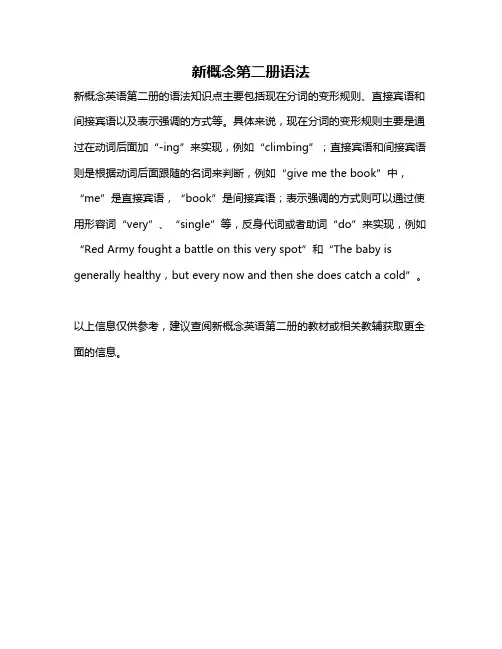
新概念第二册语法
新概念英语第二册的语法知识点主要包括现在分词的变形规则、直接宾语和间接宾语以及表示强调的方式等。
具体来说,现在分词的变形规则主要是通过在动词后面加“-ing”来实现,例如“climbing”;直接宾语和间接宾语则是根据动词后面跟随的名词来判断,例如“give me the book”中,“me”是直接宾语,“book”是间接宾语;表示强调的方式则可以通过使用形容词“very”、“single”等,反身代词或者助词“do”来实现,例如“Red Army fought a battle on this very spot”和“The baby is generally healthy,but every now and then she does catch a cold”。
以上信息仅供参考,建议查阅新概念英语第二册的教材或相关教辅获取更全面的信息。
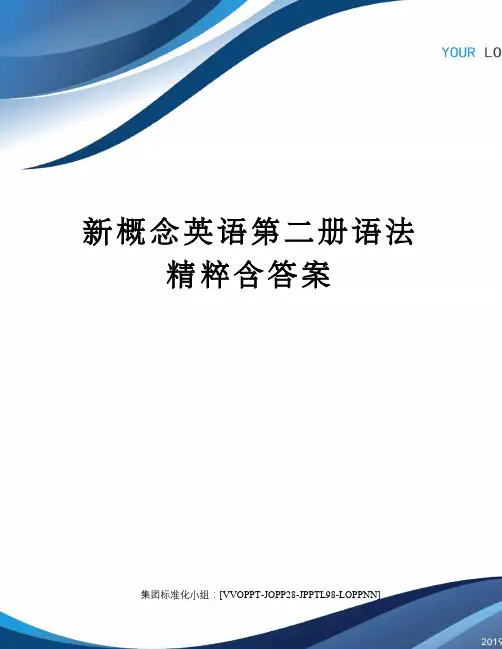
新概念英语第二册语法精粹含答案集团标准化小组:[VVOPPT-JOPP28-JPPTL98-LOPPNN]【专项训练】:1、We can’t live without air.A.an B.×C.the D.some2、——Have you seen penI left it here this morning.——Is it black oneI think I saw it somewhere.A.a; the B.the; the C.the; a D.a; a3、I’ve been waiting for him for hour and half.A.×; ×B.the; a C.a; the D.an; a4、What fine weather we have today!A.a B.×C.some D.an5、Have you ever seen as tall as this one?A.a tree B.such tree C.an tree D.tree6、Children usually go to school at age of six.A.×; the B.a; an C.the; ×D.the; the7、Himalayas is highest mountain in world.A.×; the;×B.The; the; the C.A; a; a D.×;×;×8、They each have __book. Li Hua’s is about writer. Wang Lin’s is onscience.A.a; a; ×B.the; ×; the C.×; the; ×D.a; the; a9、Physics is science of matter and energy.A.The; ×B.×; ×C.×; the D.A; a10、sun rises in east and sets in west.A.A; an; a B.The;×;×C.The; the; the D.A; the; a11、Many people agree that__knowledge of English is a must ininternational trade today.A.a;×B.the; an C.the; the D.×; the 12、__Mr Jones called while you were out (neither of us knows this man). Hewas in badtemper. A.×;a B.A;×C.The; the D.A; a 13、They were at dinner then. It was delicous one.A.a; the B.×;×C.×;a D.a; a14、what kind of car do you want to buy?A.×B.the C.a D.an15、Alice is fond of playing piano while Henry is interested in listening tomusic.A.×; the B.×;×C.the; ×D.the; the16、Beyond stars, the astronaut saw nothing butspace.A.the; ×B.×; the C.×;×D.the; the17、Alexander Graham Bell invented telephone in 1876.A.×B.a C.the D.one 18、——Where’s Jack?——I think he’s still in bed, but he might just be inbathroom.A.×;×B.the; the C.the; ×D.×; the19、Many people are still in habit of writing silly things in public places.A.the; the B.×;×C.the; ×D.×; the 20、——I’d like information about the management of your hotel, please.——Well, you could have word with the manager. He might be helpful.A.some; a B.an; some C.some; some D.an; a【答案】:1、B air是不可数名词。
语法精粹一、冠词The Article知识要点:冠词是一种虚词,放在名词的前面,帮助说明名词的含义。
冠词分不定冠词(The Indefinite Article)和定冠词(The definite Article)两种。
a (an) 是不定冠词,a用在辅音之前:如a book,a man; an用在元音之前,如:an old man, an hour, an interesting book等。
the是定冠词。
一、不定冠词的用法1、指人或事物的某一种类(泛指)。
这是不定冠词a (an)的基本用法。
如:She is a girl. I am a teacher. Please pass me an apple.2、指某人或某物,但不具体说明何人或何物。
如:He borrowed a story-book from the library.A Wang is looking for you. 一位姓王的同志正在找你。
3、表示数量,有“一”的意思,但数的概念没有one强烈。
如:I have a mouth, a nose and two eyes.4、用于某些固定词组中。
如:a bit, a few, a little, a lot of, a piece of, a cup of, a glass of, a pile of,a pair of, have a good time, for a while, for a long time等。
5、用在抽象名词前,表具体的介绍——a + 抽象名词,起具体化的作用。
如:This little girl is a joy to her parents. 这女孩对她父母来说是一个乐趣。
It is a pleasure to talk with you. 跟您交谈真是一件愉快的事情。
It is an honour to me to attend the meeting. 参加这个会,对我来说是一种荣誉。
《新概念英语第二册》语法精粹 一、冠词The Article 知识要点: 冠词是一种虚词,放在名词的前面,帮助说明名词的含义。冠词分不定冠词(The Indefinite Article)和定冠词(The definite Article)两种。a (an) 是不定冠词,a用在辅音之前:如a book, a man; an用在元音之前,如:an old man, an hour, an interesting book等。the是定冠词。 一、不定冠词的用法 1、指人或事物的某一种类(泛指)。这是不定冠词a (an)的基本用法。如:She is a girl. I am a teacher. Please pass me an apple. 2、指某人或某物,但不具体说明何人或何物。如:He borrowed a story-book from the library. A Wang is looking for you. 一位姓王的同志正在找你。 3、表示数量,有“一”的意思,但数的概念没有one强烈。如: I have a mouth, a nose and two eyes. 4、用于某些固定词组中。如:a bit, a few, a little, a lot of, a piece of, a cup of, a glass of, a pile of, a pair of, have a good time, for a while, for a long time等。 5、用在抽象名词前,表具体的介绍——a + 抽象名词,起具体化的作用。如: This little girl is a joy to her parents. 这女孩对她父母来说是一个乐趣。 It is a pleasure to talk with you. 跟您交谈真是一件愉快的事情。 It is an honour to me to attend the meeting. 参加这个会,对我来说是一种荣誉。 二、定冠词的用法: 1、特指某(些)人或某(些)事物。这是定冠词the的基本用法。如: Beijing is the capital of China. The pen on the desk is mine. 2、指谈话双方都知道的人或事物。如: Where is the teacher? Open the window, please. 3、指上文提过的人或事物(第二次出现)。如: There was a chair by the window. On the chair sat a young woman with a baby in her arms. The baby was thin. 4、用在世界上独一无二的事物前。如:the earth, the moon, the sun. 5、用在序数词和形容词最高级前。(副词最高级前的定冠词可省略)如: He is always the first to come to school. Bob is the tallest in his class. 6、用在某些专有名词前(由普通名词构成的专用名词)。如:the Great Wall, the Summer Palace, the Science Museum, the Children’s Palace, the Party等。 7、用在一些习惯用语中。如:on the day, in the morning (afternoon, evening), the day after tomorrow, the day before yesterday, the next year, by the way等。 8、用在江河湖海、山脉前。如:the Yellow River, the Pacific Ocean, the Alps, the Himalayas 9、用在报刊、杂志前。如:the People’s Daily, the Evening Paper, the Times 泰晤士报。 10、表示某一家人要加定冠词。如: The Browns are at home to receive visitors today. 布朗一家今天要接待客人。 11、用在形容词前,表某一类人。如:the poor, the wounded, the living, the dead, the rich, the sick等。 12、定冠词可以表示一事物内部的某处。如: The driver always sits in the front of the bus(car). 三、零冠词(即不用冠词): 1、专用名词和不可数名词前。如:China, America, Grade One, Class Two, milk, oil, water, paper, science等。 2、名词前已有作定语用的this, that, my, your, some, any等代词。如: Go down this street. 3、复数名词表示一类人或事物时。如: We are students. I like reading stories. 4、节日、日期、月份、季节前。如:Teachers’ Day, Children’s Day, National Day, in summer, in July等。 Today is New Year’s Day. It is Sunday. March 8 is Women’s Day. 5、在称呼语或表示头衔的名词前,尤其作表语、宾补时。如: What’s the matter, Granny? We elected him monitor. 6、在某些习惯用语中的名词前。如:at noon, at night, at first, at last, at most, at least, by bus(train, air, sea), in bed, in time, in front of, go to school, go to bed, go to college, on foot, at table, in ink, in pencil等。 7、在三餐饭和球类运动前。如: She goes to school after breakfast every morning. We are going to play football. We usually have lunch at school. 8、科目前不加。如: We learn Chinese, maths, English and some other subjects. 【专项训练】: 1、 We can’t live without air. A.an B.× C.the D.some 2、——Have you seen pen? I left it here this morning. ——Is it black one? I think I saw it somewhere. A.a; the B.the; the C.the; a D.a; a 3、I’ve been waiting for him for hour and half. A.×; × B.the; a C.a; the D.an; a 4、What fine weather we have today! A.a B.× C.some D.an 5、Have you ever seen as tall as this one? A.a tree B.such tree C.an tree D.tree 6、Children usually go to school at age of six. A.×; the B.a; an C.the; × D.the; the 7、 Himalayas is highest mountain in world. A.×; the;× B.The; the; the C.A; a; a D.×;×;× 8、They each have __book. Li Hua’s is about writer. Wang Lin’s is on science. A.a; a; × B.the; ×; the C.×; the; × D.a; the; a 9、 Physics is science of matter and energy. A.The; × B.×; × C.×; the D.A; a 10、 sun rises in east and sets in west. A.A; an; a B.The;×;× C.The; the; the D.A; the; a 11、Many people agree that__knowledge of English is a must in international trade today. A.a;× B.the; an C.the; the D.×; the 12、 __Mr Jones called while you were out (neither of us knows this man). He was in bad temper. A.×;a B.A;× C.The; the D.A; a 13、They were at dinner then. It was delicous one. A.a; the B.×;× C.×;a D.a; a 14、what kind of car do you want to buy? A.× B.the C.a D.an 15、Alice is fond of playing piano while Henry is interested in listening to music. A.×; the B.×;× C.the; × D.the; the 16、Beyond stars, the astronaut saw nothing but space. A.the; × B.×; the C.×;× D.the; the 17、Alexander Graham Bell invented telephone in 1876. A.× B.a C.the D.one 18、——Where’s Jack? ——I think he’s still in bed, but he might just be in bathroom. A.×;× B.the; the C.the; × D.×; the 19、Many people are still in habit of writing silly things in public places. A.the; the B.×;× C.the; × D.×; the 20、——I’d like information about the management of your hotel, please. ——Well, you could have word with the manager. He might be helpful. A.some; a B.an; some C.some; some D.an; a 【答案】: 1、B air是不可数名词。 2、D 此题为97年高考题。根据句意,第一空是泛指,第一次出现;第二空仍是泛指,且表数量“-”。 3、D 元音前用an。 4、B weather是不可数名词。 5、A 此题为85年高考题。泛指。 6、A go to school是固定短语。 7、B 山脉、形容词最高级及世界上的唯一的名词前加定冠词。 8、A 第一、二空泛指,第三空,science是不可数名词。 9、C 第一空,科目前不加冠词;第二空特指,有定语。 10、C 11、A 第一空,a + 不可数名词表具体的介绍;第二空,trade不可数。 12、D 第一空是指有一位琼斯先生在您不在的时候来访。(括号里说明,我们俩都不认识这个人,因此不是特指。)第二空是固定短语,情绪不好。 13、C 第一空at dinner正在吃饭,固定短语。 14、A 泛指 15、C 此题是89年高考题:乐器前加定冠词;music是不可数名词。 16、A 此题是90年高考题:stars前应加定冠词;space不可数。 17、C 此题是91年高考题:发明应是特指。 18、D 此题是92年高考题。in bed是固定短语,不加冠词。 19、C 此题是93年高考题。第一空后有定语,固是特指。第二空, public places,公共场所,泛指。 20、A 此题是95年高考题。information是不可数名词;have a word with sb.是固定短语。